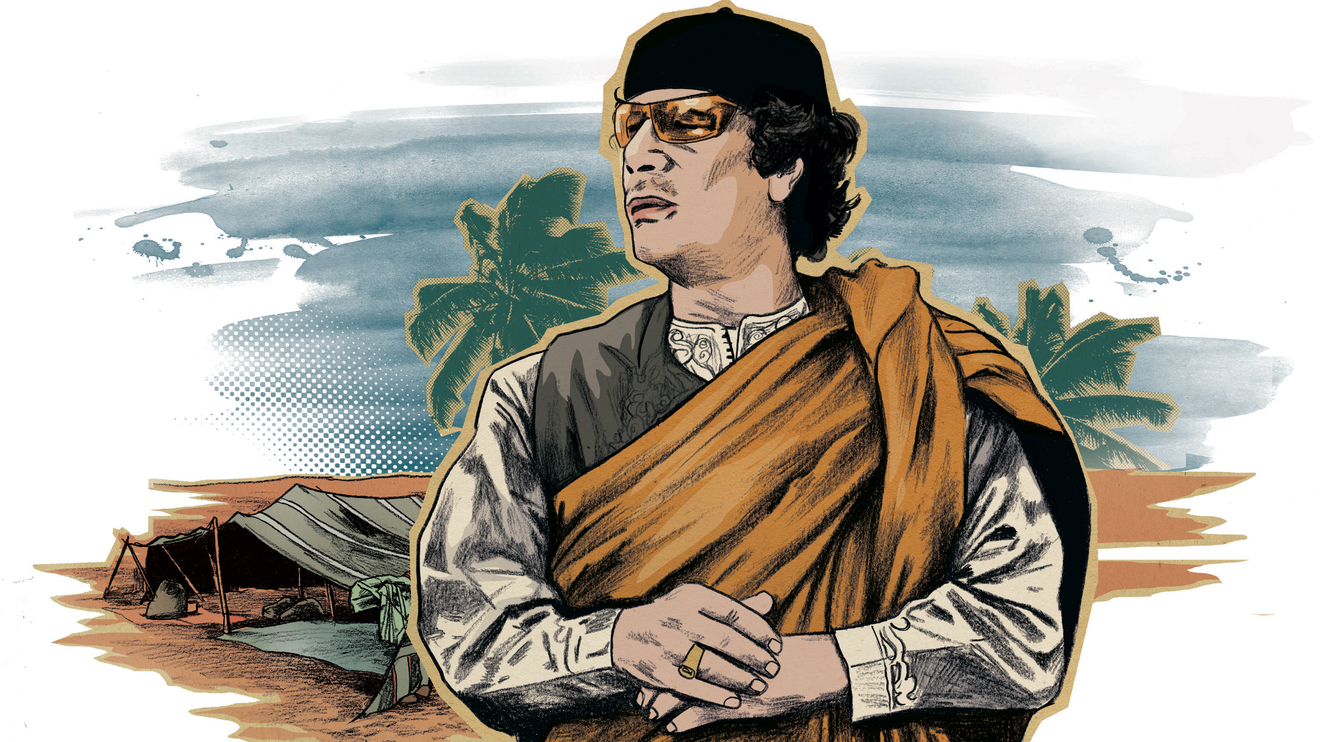
Lost Treasure
Where is Muammar Gaddafi’s money? Rebels pulled the Libyan dictator from a sewage pipe near his hometown of Sirte on October 20, 2011. He was bleeding from his head, and rebels and bystanders joined in beating him and clubbing his groin with a bayonet. Shortly thereafter, this bird of paradise among African autocrats was dead.
But shortly before he died, Gaddafi sold a fifth of Libya’s gold reserves, and most of the proceeds from this sale are still missing. The so-called Panama Papers could now shed light on the search for this incredible fortune.
Through a network of cryptic corporate investments, secret front companies and hidden bank accounts, Gaddafi had managed to set aside a fortune since the fall of the Libyan king in 1969. Oil had made Libya and, in turn, Gaddafi, rich. The former military captain is said to have been in possession of between $100 million and $200 million. Dozens of international lawsuits and investigations are still underway, with the return of funds as their central aim.
Documents made available to Süddeutsche Zeitung (SZ) by an anonymous source calling itself “John Doe” have now implicated two of Gaddafi’s most trusted advisors: one of his greatest protégés, and his chief investor. The former earned millions through obscure appointments through the state, while to this day the latter is probably hiding billions of dollars at the behest of and for the Gaddafi clan. Both of these men had been on Interpol’s wanted list for several years.
Gaddafi's Banker
A central figure in the search for Gaddafi’s money is a man called Bashir Saleh Bashir, who was once the Libyan leader’s chief of staff and right-hand man. In Libya, he is still known as “Gaddafi’s banker.” Bashir is alleged to have invested and hidden the private wealth of the Gaddafi clan. In addition, he used to manage a multi-billion-dollar branch of Libyan state funds: namely, the oil-funded money reserve to which Gaddafi had free access. The so-called “Libya Africa Investment Portfolio” invested oil business proceeds in other African states, but where exactly the money flowed to can no longer be determined. Many Libyans say that Gaddafi — who, depending on his mood, liked to call himself “The Leader of Arab Leaders,” the “Imam of all Muslims” or simply the “King of Kings of Africa” — probably pocketed the money himself.After Gaddafi responded with military force to demonstrators in February 2011, the United Nations began sanctioning people, properties and companies with ties to his regime. As part of these measures, assets belonging to Gaddafi’s banker, Bashir, were also frozen by the European Union and Switzerland. The state-run Libya Africa Investment Portfolio was, shortly thereafter, included on the sanctions list of the United Nations Security Council, due to its status as a “potential source of funding” for the Libyan regime. Gaddafi and his protégés were to be kept from doing business or moving money. But as the Panama Papers reveal, Bashir seems to have taken a few precautions for just such an eventuality. The Libya Africa Investment Portfolio owned shares of a front company called Vision Oil Services Limited, which Libya-experts Süddeutsche Zeitung contacted had no prior knowledge of.
Vision Oil Services Limited was obviously Gaddafi’s banker’s little
secret. Panama law firm Mossack Fonseca founded the company in 2007, but
it remained inactive for years because no administrative fees were
paid. Only on March 10, 2011, when the end of the Gaddafi regime became
apparent, were all outstanding invoices suddenly paid in full and was a
“Certificate of Good Standing” obtained to reactivate the company. This
took place ten days after Gaddafi’s banker Bashir had been sanctioned.
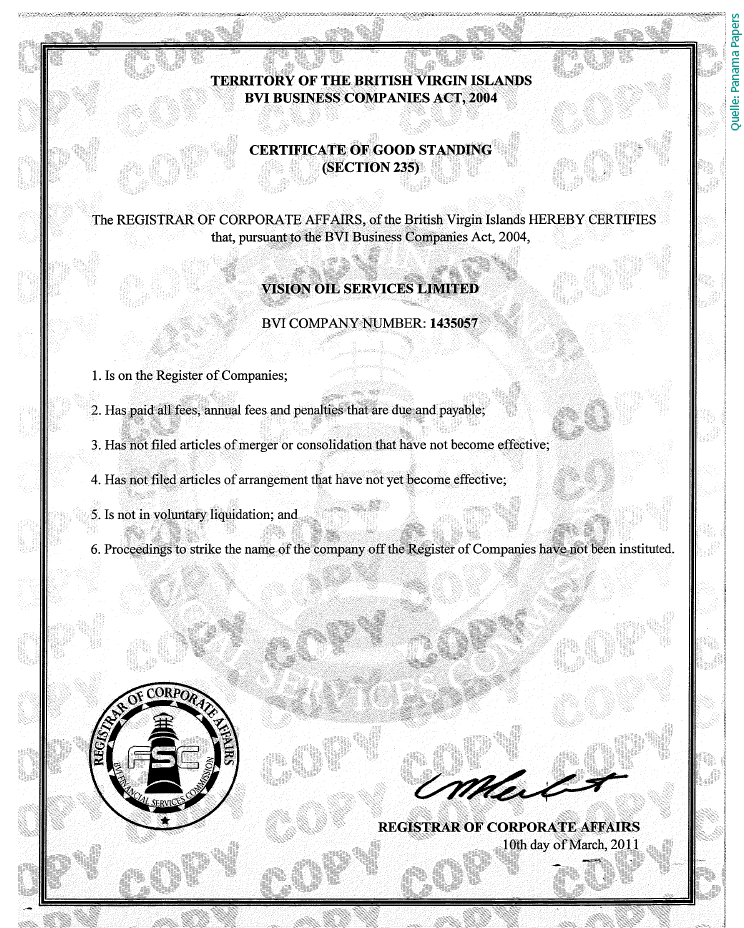
The offshore company was camouflaged perfectly. Neither the Libya Africa Investment Portfolio nor Bashir were mentioned in any of the official documents. A Saudi Arabian man operating as the firm’s sham director and general manager had the power of attorney to open accounts at the Geneva bank Pictet, the Viennese branch of Landsbanki Luxembourg and Standard Chartered Bank in Singapore. This Saudi Arabian man was said to have previously done business with Jordanian oil smugglers and spent time in a Libyan prison for money-related offenses that maybe have been directly related to Gaddafi.
The Saudi Arabian man resigned as director of Vision Oil Services Limited at the beginning of April 2011, appointing a Briton living in Germany as his successor. In response to Süddeutsche Zeitung’s queries, this British national denied having any knowledge of the company’s dealings. He said that he was merely the employee of the Saudi Arabian man and had worked as a fake director once his employer found himself in a dangerous situation. So, while Gaddafi’s troops and rebels were embroiled in increasingly intense fighting, the Saudi Arabian sham director appointed a British sham director, making the already opaque company structure even more complicated, and thereby adding another layer of protection.
Gaddafi died only a few months after these events took place. The rebels arrested Bashir, whose passport photocopy can be found among the Panama Papers.
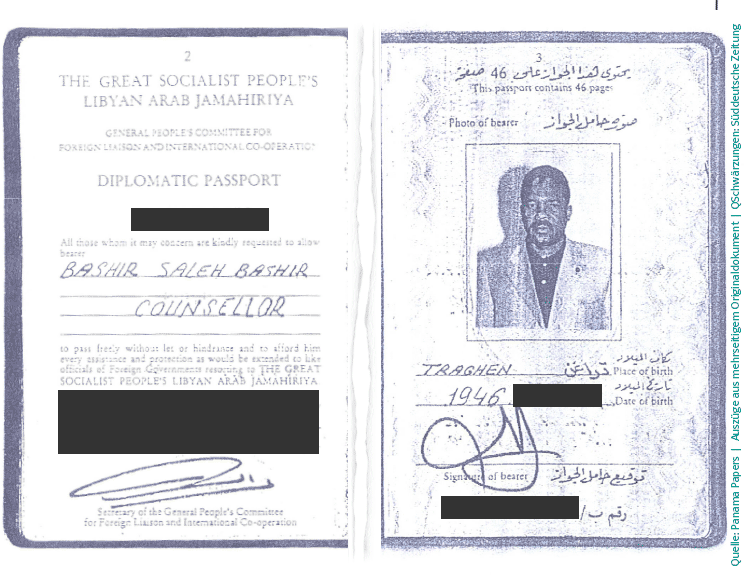
But he was somehow released in the turmoil of the ensuing civil war. During these months of unrest, all traces of Vision Oil Services Limited were lost, as well. The local authorities of the British Virgin Islands deactivated the front company due to its outstanding administrative fees. It is not known if potential company assets had been transferred prior to this, and this information cannot be gleaned from the contents of the Panama Papers.
Bashir, however, suddenly re-emerged in Niger before disappearing again. He was sighted in South Africa several times and, according to rumors, lives in Swaziland. He is said to be the only person privy to all the secrets of Libyan investments in Africa, or so suggests the rumor-mill in Tripolis. Bashir does not speak with the press and couldn’t be reached by Süddeutsche Zeitung for a request for comment.
A breakthrough in the search for Gaddafi’s treasure seemed imminent in 2012, when Libya’s former head of intelligence services, Abdullah Sanussi, reported that Gaddafi had buried his gold in the Libyan desert. A former Libyan minister reportedly also offered to help find Gaddafi’s assets, but he was found dead only days later, drifting face down in the Danube; he died before he could provide any information. In the end, Sanussi did not disclose the exact location of Gaddafi’s gold, either.
While some of Gaddafi’s millions have since turned up in Italy, Germany and the U.S., the majority of his wealth remains unaccounted for. According to reliable sources, investigators searching for Gaddafi’s treasure have set their sights not only on Bashir, but also on a certain Ali Dabaiba, a man who was once part of the dictator’s inner circle, known to Libyans as “companions of the leader”.
According to Libyan investigators, the country’s Organisation for Development of Administrative Centres (ODAC) — a gigantic ministry handling all state business and overseen by Dabaiba — awarded business contracts worth billions of dollars to numerous companies with direct links to Dabaiba’s family.
According to press reports, when auditors examined these business contracts more closely after Gaddafi’s fall, they discovered creative bookkeeping practices. According to these reports one of Gaddafi’s advisors explained to investigators that ODAC discrepancies had emerged quite early on, but these were not examined in any detail seeing as Gaddafi and as his sons were involved in managing ODAC.
Dabaiba did not answer Süddeutsche Zeitung’s request for comment. The Dabaiba family nevertheless wrote to the Guardian dismissing the allegations as baseless. Their Libyan lawyer claimed they are “not wanted by any judicial, financial or security bodies”.
Although the disreputable Dabaiba changed sides at the height of the Libyan civil war and financed the rebels in his hometown of Misrata, the new government nonetheless froze his assets and placed his name on a list of men who were suspected of having embezzled state funds. He eventually moved to London, where his family owns a few valuable properties. Libyan investigators accuse Dabaiba of having dished out contracts worth several million dollars to companies either he or one of his relatives managed. He is said to have smuggled the profits from these dealings abroad through a network of shell companies.
To date, investigators have traced around 100 companies registered in the British Virgin Islands, Malta, Lichtenstein and the UK to Dabaiba, his sons or presumed accomplices. The true ownership structures of these firms remains hazy at best.
However, this might soon change. Many of the front companies, presumably owned by Gaddafi’s loyal cronies, were managed by Mossack Fonseca, the Panama law firm at the heart of the Panama Papers scandal that broke in April of this year.
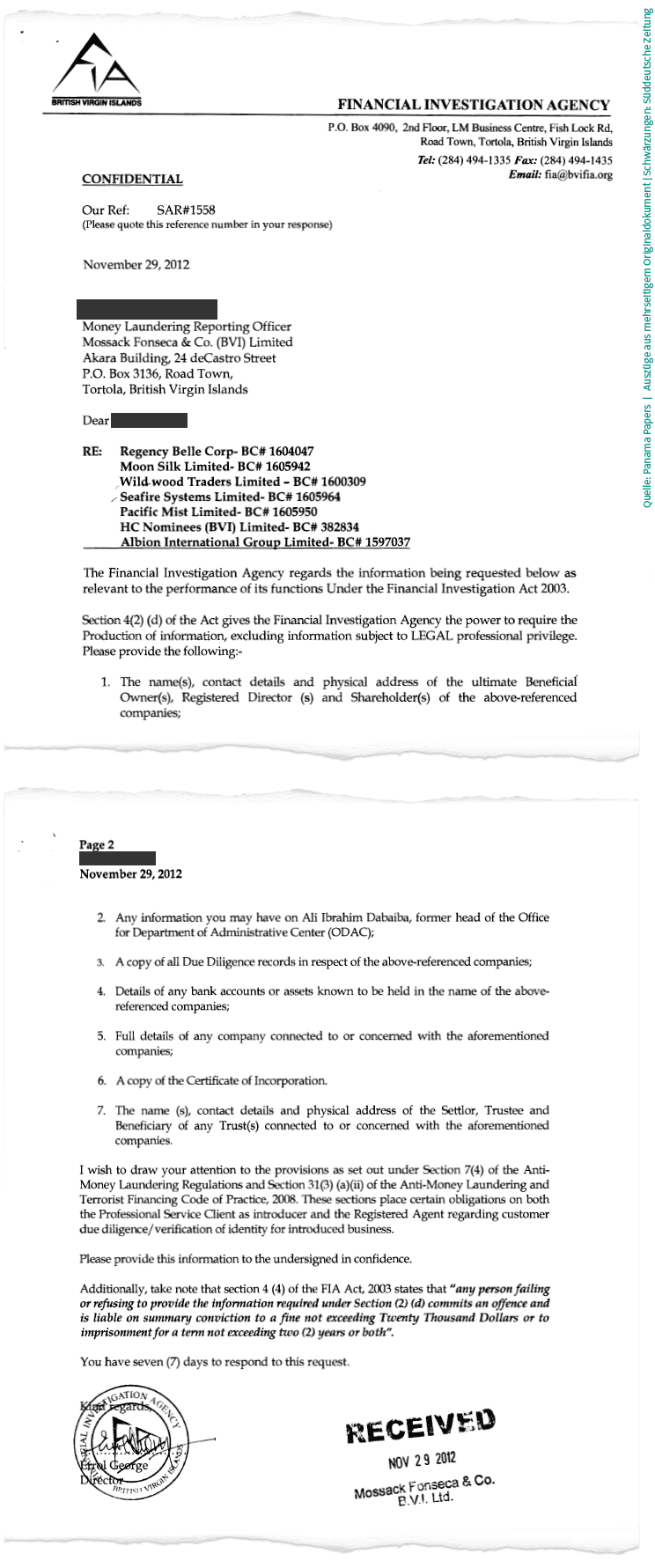
The name of British national Riad G. appears in the documents repeatedly in connection with several of the front companies that Libyan investigators attribute to Dabaiba.
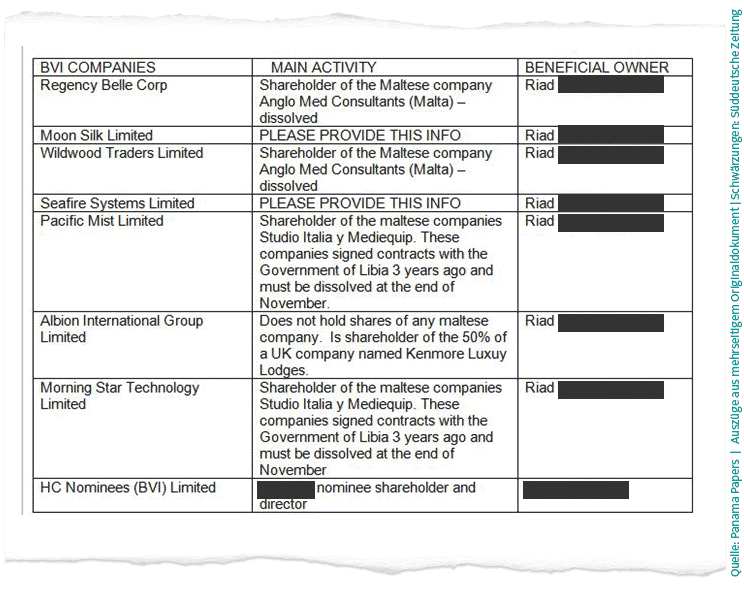
Riad G. went to school in Libya and attended university in London. His Facebook page indicates that he is connected to the Dabaiba family. He apparently once owned half the shares of a hotel in the Scottish Highlands: the company behind the hotel ownership was used to hide Libyan state funds, according to a document written by Libyan investigators, who were seeking legal help from the British and Scottish authorities. Süddeutsche Zeitung and Guardian have been able to access parts of these documents, which accuse Dabaiba of abuse of office and illegal money transfers that harmed the public budget, among other things.
According to the trade register, the company behind the luxury hotel is run by two men who received ODAC contracts worth several million in 2008. That’s the same ODAC formerly headed by Dabaiba — and so everything has come full circle. Scottish authorities confirmed that investigations into this matter are currently underway. Investigators, for their part, are disinclined to believe Dabaiba’s most recent declaration of assets, which stated that he only owns a few cars, some jewelry and a farm with four camels.






